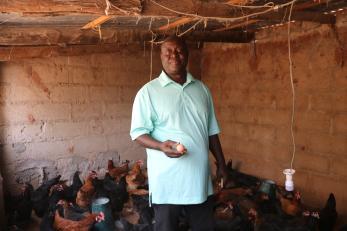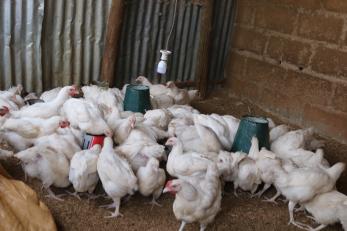Training on financial literacy improving livelihoods of VSLA members

The birth of Albarka VSLA
Paul Msheliza is a 51-year-old father of six children, who combines teaching in government primary school with investment in small-scale poultry and farming, in order to raise sufficient income to feed his family and keep them in schools.
Like most low-income earners in Yimirshika, a small community in Southern Borno in Northeast Nigeria, access to formal financial services is a formidable hurdle to overcome, hence the need for a community-managed savings mechanism. Most farmers need funds to buy agricultural inputs such as seeds, fertilizers, livestock feeds, and pesticides to improve their yields and productivity. The main crops cultivated in Yimirshika include millet, rice, sorghum, cowpea, maize, and groundnut.
In 2010, Paul and five people started Albarka Village Savings and Loan Association (VSLA) group, which now has 60 active members. The members of Albarka VSLA group are mostly crop and poultry farmers, and small-scale traders. The members were contributing about NGN300 weekly to provide loans to one another. As the years go by, Paul and his group members continued running the group, albeit, with low knowledge of financial literacy and group management. They lacked the financial education to grow the group’s income and create more value for their members.
“Before, when we contribute money, we share the money amongst ourselves at the end of the year.”
Financial literacy for Albarka VSLA
Paul attended one of the financial literacy training, organized by the USAID-funded Feed the Future Nigeria Rural Resilience Activity, for VSLAs in the Southern part of Borno State (Biu, Kwaya Kusar, and Hawul Local Government Areas) between March and April 2021. The training built the capacities of 135 savings groups in business management, record keeping, and savings group management. Through the training, 3,375 participants like Paul and his group members, in vulnerable communities were trained to effectively use financial services to meet basic financial needs, manage risks and take advantage of investment opportunities in agriculture and related livelihood activities.
“We learned the importance of investing a part of our savings in ventures that will yield more money for us. Like last year, we raised about NGN1.1 million and then got NGN450,000 as interest. We kept NGN250,000 for reinvestment and shared the remaining NGN200,000 amongst ourselves.”
As of March 2022, the Activity had trained 4,473 savings groups in Borno, Adamawa, Yobe, and Gombe states in Northeast Nigeria.
Albarka VSLA creating value for group members
According to Paul, the training supported by the Rural Resilience Activity has been of immense help to him and his members. For him, the training expanded his knowledge on how to use loans to boost his livelihood.
“Most of our people collected loans to buy inputs. Without this loan, you cannot hire a farm, you cannot buy fertilizer, or hire people to work for you."
“Last year I collected a loan of NGN150,000 which I invested in wet season farm production. Also, because we use firewood to cook, I used part of the money to purchase firewood logs. This will last my household for over a year, and I will not have to worry about buying firewood.”

Recently, Paul invested in 250 poultry birds that he intends to sell at three weeks old at the rate of NGN2,000 each for the broilers and NGN1,500 each for the noilers, depending on the market rate at the period. He plans to invest the profit from the poultry business in the wet season farming period that is fast approaching.
“I collected another loan of NGN100,000 and I used the money to buy 100 broiler and 150 noiler chicks,’’ said Paul who is happy to have benefitted from the Rural Resilience Activity’s interventions.